July 20, 2021
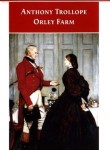 Our third Orley Farm Cocktail Talk revisits a character introduced in Part II (for more on the overall book, see Part I, and for more Trollopean fun, see all past Anthony Trollope Cocktail Talks), traveling salesman for Hubbles and Grease, Mr. Moulder. In this quote, we find our rotund commercial traveler at home for Christmas celebrations, where he and his missus are hosting a few others for a big feast, and where Mr. Moulder is talking of the liquid possibilities for the day, specifically brandy and a special whiskey,
Our third Orley Farm Cocktail Talk revisits a character introduced in Part II (for more on the overall book, see Part I, and for more Trollopean fun, see all past Anthony Trollope Cocktail Talks), traveling salesman for Hubbles and Grease, Mr. Moulder. In this quote, we find our rotund commercial traveler at home for Christmas celebrations, where he and his missus are hosting a few others for a big feast, and where Mr. Moulder is talking of the liquid possibilities for the day, specifically brandy and a special whiskey,
And then, as for drink, —”tipple,” as Mr. Moulder sportively was accustomed to name it among his friends, he opined that he was not altogether behind the mark in that respect. “He had got some brandy—he didn’t care what anybody might say about Cognac and eau de vie; but the brandy which he had got from Betts’ private establishment seventeen years ago, for richness of flavour and fullness of strength, would beat any French article that anybody in the city could show. That at least was his idea. If anybody didn’t like it, they needn’t take it. There was whisky that would make your hair stand on end.” So said Mr. Moulder, and I can believe him; for it has made my hair stand on end merely to see other people drinking it.
— Anthony Trollope, Orley Farm
July 13, 2021
 Welcome to the second part of our tipsy tour through the Anthony Trollope novel Orley Farm (don’t miss Part I, or any of the past Anthony Trollope Cocktail Talks). In the first part, I chatted a smidge about the novel itself, and where it slots into my own personal Trollope-verse, if you will. One thing I didn’t mention there, however, is perhaps my top character in the book, a commercial traveler (or traveling salesman, if you will), named Mr, Moulder, a lover of food and drink and a representative of the fine old firm of Hubbles and Grease, purveyors of find coffee, tea, and brandy. Randomly showing up when one of the novel’s major players stops at a fine old English inn, The Bull, Mr. Moulder shows up again, and I was happier for it. But the below quote (they’ll be more from our Mr. Moulder) is in his introduction graph, and gives a nice view into him, if you will.
Welcome to the second part of our tipsy tour through the Anthony Trollope novel Orley Farm (don’t miss Part I, or any of the past Anthony Trollope Cocktail Talks). In the first part, I chatted a smidge about the novel itself, and where it slots into my own personal Trollope-verse, if you will. One thing I didn’t mention there, however, is perhaps my top character in the book, a commercial traveler (or traveling salesman, if you will), named Mr, Moulder, a lover of food and drink and a representative of the fine old firm of Hubbles and Grease, purveyors of find coffee, tea, and brandy. Randomly showing up when one of the novel’s major players stops at a fine old English inn, The Bull, Mr. Moulder shows up again, and I was happier for it. But the below quote (they’ll be more from our Mr. Moulder) is in his introduction graph, and gives a nice view into him, if you will.
He wore no beard, and therefore showed plainly the triple bagging of his fat chin. In spite of his overwhelming fatness, there was something in his face that was masterful and almost vicious. His body had been overcome by eating, but not as yet his spirit—one would be inclined to say. This was Mr. Moulder, well known on the road as being in the grocery and spirit line; a pushing man, who understood his business, and was well trusted by his firm in spite of his habitual intemperance. What did the firm care whether or no he killed himself by eating and drinking? He sold his goods, collected his money, and made his remittances. If he got drunk at night that was nothing to them, seeing that he always did his quota of work the next day. But Mr. Moulder did not get drunk. His brandy and water went into his blood, and into his eyes, and into his feet, and into his hands, —but not into his brain.
–Anthony Trollope, Orley Farm
July 6, 2021
 Well, I love me some Anthony Trollope. But everyone knows that. I mean, take a gander at all the past wonderful (I say, humbly), Anthony Trollope Cocktail Talk posts – there are a fair number of them where I wander on about Trollope and reading and re-reading his books. So, my Trollope adoration bonafides are in place, which means it’s okay to say that I’m not 100% sure that I love his large novel Orley Farm. There are parts of it I love, lots. And I believe Trollope himself considered it one of his best (it may have been his favorite), as did a few of his writing contemporaries. And it is a big, Trollopean story, with interesting characters, a plot hook or three, threads that start in multiple spots and are drawn together, and insights and actions that, while taking place in a different time, mirror in many ways how people act today. So, all good! However, there’s something that throws me off a bit about the book. I think in some ways, Trollope (this happens in other books on occasion, too, but here it feels off-putting) begins not to like one of the characters he introduces early (one of the spotlight characters, you could say), and brings in a separate thread, fairly late for him, to introduce perhaps some new characters he’s more fond of – if that makes any sense. Which throws me off somewhat when reading it, as I develop an affection for the earlier character. Anyway, let’s just say it’s not one of my favorite Trollope books, but it’s still awesome, with a plot spinning (in the main, outside of the side trips alluded to above) around a codicil to a will that may or may not be forged. Intrigued? Give it a read! There are also lots of convivial drinking moments, as there are apt to be with our pal Trollope, so I plan on sticking with the book here with some good Cocktail Talking quotes. Starting with the below, which focuses on port and one of the lawyers who take part in our tale, there are a number of lawyers, as you might expect with a book circling round a will.
Well, I love me some Anthony Trollope. But everyone knows that. I mean, take a gander at all the past wonderful (I say, humbly), Anthony Trollope Cocktail Talk posts – there are a fair number of them where I wander on about Trollope and reading and re-reading his books. So, my Trollope adoration bonafides are in place, which means it’s okay to say that I’m not 100% sure that I love his large novel Orley Farm. There are parts of it I love, lots. And I believe Trollope himself considered it one of his best (it may have been his favorite), as did a few of his writing contemporaries. And it is a big, Trollopean story, with interesting characters, a plot hook or three, threads that start in multiple spots and are drawn together, and insights and actions that, while taking place in a different time, mirror in many ways how people act today. So, all good! However, there’s something that throws me off a bit about the book. I think in some ways, Trollope (this happens in other books on occasion, too, but here it feels off-putting) begins not to like one of the characters he introduces early (one of the spotlight characters, you could say), and brings in a separate thread, fairly late for him, to introduce perhaps some new characters he’s more fond of – if that makes any sense. Which throws me off somewhat when reading it, as I develop an affection for the earlier character. Anyway, let’s just say it’s not one of my favorite Trollope books, but it’s still awesome, with a plot spinning (in the main, outside of the side trips alluded to above) around a codicil to a will that may or may not be forged. Intrigued? Give it a read! There are also lots of convivial drinking moments, as there are apt to be with our pal Trollope, so I plan on sticking with the book here with some good Cocktail Talking quotes. Starting with the below, which focuses on port and one of the lawyers who take part in our tale, there are a number of lawyers, as you might expect with a book circling round a will.
Mrs. Furnival in discussing her grievances would attribute them mainly to port wine. In his early days Mr. Furnival had been essentially an abstemious man. Young men who work fifteen hours a day must be so. But now he had a strong opinion about certain Portuguese vintages, was convinced that there was no port wine in London equal to the contents of his own bin, saving always a certain green cork appertaining to his own club, which was to be extracted at the rate of thirty shillings a cork. And Mrs. Furnival attributed to these latter studies not only a certain purple hue which was suffusing his nose and cheeks, but also that unevenness of character and those supposed domestic improprieties to which allusion has been made.
–Anthony Trollope, Orley Farm
June 29, 2021
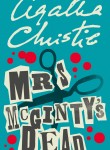 Ah, Poirot. Hercule Poirot, that is (are there other Poirots? If so, I feel for them). I know that with many books, shows, films, poems, and sculptures, some may feel a Poirot overload at times – and this isn’t even to mention the many, many, Poirot imitations and bowdlerizations. But I still love the egg-shaped Belgian, in book and movie and TV show form. Thank you Mrs. Christie! Somedays, dipping back into a Poirot yarn is just the relief a long day needs. Especially when Poirot starts hitting the sweet liqueurs (you could probably guess this), which I’ll admit also loving, probably a rarity among English speakers in his day (well, the day his adventures were set within, that is), though hopefully something not as rare today, with our lucky-for-us wider palate of bar bottle resources and consumption. Hopefully! Anyway, this is all to say, I was re-reading the classic Poirot book Mrs. McGinty’s Dead, which has it all – a murder, a perhaps wronged potential murderer, small town England townies, historical murders, more murders, and very tight patent-leather shoes. Plus: well-groomed mustaches of course! And, a wonderful listing of Poirot’s fav sweet tipples, and beer.
Ah, Poirot. Hercule Poirot, that is (are there other Poirots? If so, I feel for them). I know that with many books, shows, films, poems, and sculptures, some may feel a Poirot overload at times – and this isn’t even to mention the many, many, Poirot imitations and bowdlerizations. But I still love the egg-shaped Belgian, in book and movie and TV show form. Thank you Mrs. Christie! Somedays, dipping back into a Poirot yarn is just the relief a long day needs. Especially when Poirot starts hitting the sweet liqueurs (you could probably guess this), which I’ll admit also loving, probably a rarity among English speakers in his day (well, the day his adventures were set within, that is), though hopefully something not as rare today, with our lucky-for-us wider palate of bar bottle resources and consumption. Hopefully! Anyway, this is all to say, I was re-reading the classic Poirot book Mrs. McGinty’s Dead, which has it all – a murder, a perhaps wronged potential murderer, small town England townies, historical murders, more murders, and very tight patent-leather shoes. Plus: well-groomed mustaches of course! And, a wonderful listing of Poirot’s fav sweet tipples, and beer.
Poirot pressed his guest with refreshments. A grenadine? Crème de Menthe? Benedictine? Crème de Cacao…
At this moment George entered with a tray on which was a whisky bottle and a siphon. “Or beer if you prefer it, sir?” he murmured to the visitor.
Superintendent Spence’s large red face lightened.
“Beer for me,” he said.
Poirot was left to wonder once more at the accomplishments of George. He himself had had no idea that there was beer in the flat and it seemed incomprehensible to him that it could be preferred to a sweet liqueur.
When Spence had his foaming tankard, Poirot poured himself out a tiny glass of gleaming green crème de menthe.
–Agatha Christie, Mrs. McGinty’s Dead
Tags: Agatha Christie, beer, Benedictine, Cocktail Talk, crème de cacao, Crème de menthe, grenadine, Hercule Poirot, Mrs. McGinty’s Dead, Poirot, Whiskey
Posted in: beer, Cocktail Talk, Liqueurs, Whiskey
June 15, 2021
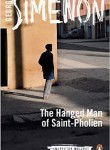 One last stop on our month-or-such-of-Maigret, though I can’t imagine we’ll be leaving our Parisian Chief Inspector (the great creation of great writer George Simenon) for long – we’ve had a decent amount of Maigret Cocktail Talks, and let’s hope it won’t be the last. The Hanged Man of Saint-Pholien is another good Maigret read, a very interesting one, as Maigret manages to travel to Belgium, back to France, to history, to many secrets, to Armagnac, all by following a shabby traveler and on a hunch switching suitcases.
One last stop on our month-or-such-of-Maigret, though I can’t imagine we’ll be leaving our Parisian Chief Inspector (the great creation of great writer George Simenon) for long – we’ve had a decent amount of Maigret Cocktail Talks, and let’s hope it won’t be the last. The Hanged Man of Saint-Pholien is another good Maigret read, a very interesting one, as Maigret manages to travel to Belgium, back to France, to history, to many secrets, to Armagnac, all by following a shabby traveler and on a hunch switching suitcases.
Maigret took selfish pleasure in his chilly response, but Van Damme sat down at his table anyway.
“You’ve finished? In that case, allow me to offer you a digestif . . . Waiter! Well, what will you have inspector? An old Armagnac?”
He called for the drinks list, and after consultation with the proprietor, chose an 1867 Armagnac, to be served in snifters.
–George Simenon, The Hanged Man of Saint-Pholien
June 8, 2021
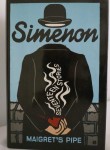 Our mini-Maigret-a-thon continues with another gem from the story collection Maigret’s Pipe (which is full of gems, don’t miss the “Mademoiselle Berthe and Her Lover” Cocktail Talk, or any of the past Chief Inspector Maigret Cocktail Talks). Here, Maigret is dealing with crimes and barges and waterways, as happens, and crimes, and gin!
Our mini-Maigret-a-thon continues with another gem from the story collection Maigret’s Pipe (which is full of gems, don’t miss the “Mademoiselle Berthe and Her Lover” Cocktail Talk, or any of the past Chief Inspector Maigret Cocktail Talks). Here, Maigret is dealing with crimes and barges and waterways, as happens, and crimes, and gin!
And Maigret became ever more deeply absorbed in the slow, ponderous life of La Citanguette, as though only there was he capable of thought. A self-propelled barge flying a Belgian flag reminded him of Theodor, Aerts’s son, who must by now have reached Paris.
At the same time, the Belgian flag suggested the thought of gin. For on the table in the cabin there had been found a bottle of gin, more than half empty. Somebody had made a thorough search of the cabin itself and even tore open the mattress covers, scatter the flock stuffing.
Obviously, in an attempt to find the hidden hoard of 100,000 francs!
–George Simenon, “Two Bodies on a Barge”
June 1, 2021
 We’re going to continue from last week’s Maigret moment into a little Maigret-a-thon, starting with a few Cocktail Talks (hey, don’t miss all the Chief Inspector Maigret Cocktail Talks, by the way) from the story collection Maigret’s Pipe, which has a host of hits starring George Simenon’s Parisian Chief Inspector, mainly leaning towards the latter part of his career and even into retirement (where he can’t stop solving crimes even if no longer on the French force). The story the below quote comes from is actually in the retirement phase, though with him back in Paris, drinking wine, and having one of his favorite dishes.
We’re going to continue from last week’s Maigret moment into a little Maigret-a-thon, starting with a few Cocktail Talks (hey, don’t miss all the Chief Inspector Maigret Cocktail Talks, by the way) from the story collection Maigret’s Pipe, which has a host of hits starring George Simenon’s Parisian Chief Inspector, mainly leaning towards the latter part of his career and even into retirement (where he can’t stop solving crimes even if no longer on the French force). The story the below quote comes from is actually in the retirement phase, though with him back in Paris, drinking wine, and having one of his favorite dishes.
As Maigret paid for the drinks, he was already looking sprightlier than he had been earlier that morning, for he felt things had begun to move.
Roughly speaking, his impression was that the police were over-simplifying the situation and Mademoiselle Berthe was complicating it. Not far off there was a small restaurant favoured by taxi-drivers, with a couple of tables on the terrace, and as one them was free he sat down and discovered on the menu fricandeau a l’oseille, veal with sorrel, one of his favorite dishes.
The atmosphere was so redolent of spring, with light puffs of air so warm and fragrant that, particularly after a bottle of Beaujolais, he felt light-headed and wanted nothing better than to lie down on the grass with a newspaper over his head.
–George Simenon, “Mademoiselle Bertha and her Lover”
May 25, 2021
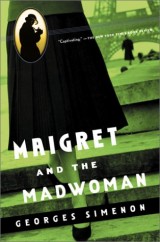 I’ve been re-reading (until I can get my happy hands on some of the books and stories I don’t yet have) a couple of George Simenon’s marvelous Inspector Maigret stories and books lately. Like many of my favorite yarns by my favorite yarn-spinners, I like to read or re-read some Maigret every so often. It’s always enjoyable just to delve back into the wonderful Parisian/French and mystery/crime and memorable character atmosphere and world Simenon created. One of the books re-read not long ago was Maigret and the Madwoman, which touches on a murder and a crime, but also into the, oh, person of Maigret himself in a way that pulls you in – or me, at least! Since it’s a re-read, and since Maigret liked tipples of various sorts, not so surprising that there is already a Maigret and the Madwoman Cocktail Talk Part I (which you should read, along with all the Inspector Maigret Cocktail Talks). Part II, this one, is wine-centric, and ideal for a spring day like today. Actually, I think I’m going to continue my reading with a chilled glass of white wine myself!
I’ve been re-reading (until I can get my happy hands on some of the books and stories I don’t yet have) a couple of George Simenon’s marvelous Inspector Maigret stories and books lately. Like many of my favorite yarns by my favorite yarn-spinners, I like to read or re-read some Maigret every so often. It’s always enjoyable just to delve back into the wonderful Parisian/French and mystery/crime and memorable character atmosphere and world Simenon created. One of the books re-read not long ago was Maigret and the Madwoman, which touches on a murder and a crime, but also into the, oh, person of Maigret himself in a way that pulls you in – or me, at least! Since it’s a re-read, and since Maigret liked tipples of various sorts, not so surprising that there is already a Maigret and the Madwoman Cocktail Talk Part I (which you should read, along with all the Inspector Maigret Cocktail Talks). Part II, this one, is wine-centric, and ideal for a spring day like today. Actually, I think I’m going to continue my reading with a chilled glass of white wine myself!
On his way back to the Quai des Orfevres, Maigret stopped at the Brasserie Dauphine for a glass of white wine from the Loire. He didn’t feel like a beer. The white wine in the frosted glass, with just a hint of a sparkle, seemed more appropriate on this lovely spring day.
It was one of the slackest time of the day. Except for a delivery man in a blue apron, there was no in the café.
He decided to order another.
–George Simenon, Maigret and the Madwoman
Tags: Cocktail Talk, George Simenon, Inspector Maigret, Maigret, Maigret and the Madwoman, Part II, spring drinking, white wine, white wine from the Loire, Wine
Posted in: Cocktail Talk, Wine
 Our third Orley Farm Cocktail Talk revisits a character introduced in Part II (for more on the overall book, see Part I, and for more Trollopean fun, see all past Anthony Trollope Cocktail Talks), traveling salesman for Hubbles and Grease, Mr. Moulder. In this quote, we find our rotund commercial traveler at home for Christmas celebrations, where he and his missus are hosting a few others for a big feast, and where Mr. Moulder is talking of the liquid possibilities for the day, specifically brandy and a special whiskey,
Our third Orley Farm Cocktail Talk revisits a character introduced in Part II (for more on the overall book, see Part I, and for more Trollopean fun, see all past Anthony Trollope Cocktail Talks), traveling salesman for Hubbles and Grease, Mr. Moulder. In this quote, we find our rotund commercial traveler at home for Christmas celebrations, where he and his missus are hosting a few others for a big feast, and where Mr. Moulder is talking of the liquid possibilities for the day, specifically brandy and a special whiskey,

























